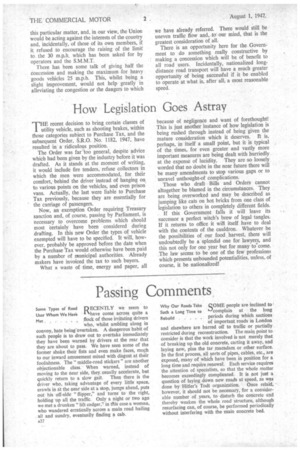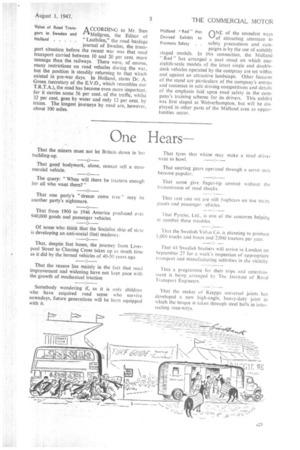Passing Comments
Page 24

Page 25

If you've noticed an error in this article please click here to report it so we can fix it.
Some Types of Road FIO ECENTLY we seem to User Whom We Have "have come across quite a Met flock of those irritating drivers who, whilst ambling along in convoy, hate being' overtaken. A dangerous habit of such people is to draw out to overtake immediately they have been warned by drivers at the rear that they are about to pass. We have seen some of the former shake their fists and even make faces, much to our inward amusement mixed with disgust at their foolishness. The "middle-road stickers" are another objectionable class. When warned, instead of moving to the near side, they usually accelerate, but quickly return to a slow gait. Then there is the driver who, taking advantage of every little space, crawls in at the near side at a stop, jumps ahead, puts out his off-side "flipper," and turns to the right, holding tip all the traffic. Only a night or two ago we met a drunken "lift cadger," in this case a woman, who wandered erratically across a main road hailing all and sundry, eventually finding a cab. Why Our Roads Take SOME people are inclined to Such a Long Time to complain at the long Rebuild periods during which sections of important roads in London and elsewhere are barred off to traffic or partially restricted during reconstruction. The main point to consider is that the work involved is not merely that of breaking up the old concrete, carting it away, and laying new, plus the tar macadam or other surface. In the first process, all sorts of pipes, cables, etc., are exposed, many of which have been in position for a long time and require renewal. Each service requires the attention of specialists, so that the whole matter becomes exceedingly complicated. It is not just a question of laying down new roads at speed, as was done by Hitler's Todt organization. Once relaid, however, it should not be necessary, for a considerable number of years, to disturb the concrete and thereby weaken the whole road structure, although resurfacing can, of course, be performed periodically without interfering with the main concrete bed. ACCORDING to Mr. Sten Mellgren, the Editor of "Lastbiten," the road haulage journal of Sweden, the transport situation before the recent war was that road transport carried between 10 and 20 per cent. more tonnage than the railways. There were, of course, many restrictions on road vehicles during the war, but the position is steadily returning to that which existed in pre-war days. In Holland, states Dr. A. Green (secretary of the E.V.0,, which resembles our T.R.T.A.), the road has become even more important, for it carries some 56 per cent, of the traffic, whilst 32 per cent, goes by water and only 12 per cent. by trains. The longest journeys by road are, however, about 100 miles.
Value of Road Transport in Sweden and Holland
Midland "Red" Has nNE of the soundest ways Devised Exhibit to of attracting attention to Promote Safety . safety precautions and cam paigns is by the use of suitably staged models. In this connection, the Midland " Red " has arranged a neat stand on which oneeighth-scale models of the latest single and doubledeck vehicles operated by the company are set within and against an attractive landscape. Other features of the stand are particulars of the company's entries and successes in safc driving competitions and details of the emphasis laid upon road safety in the company's training scheme for its drivers. This exhibit was first staged at Wolverhampton, but will be displayed in other parts of the Midland area as opportunities occur.












































































